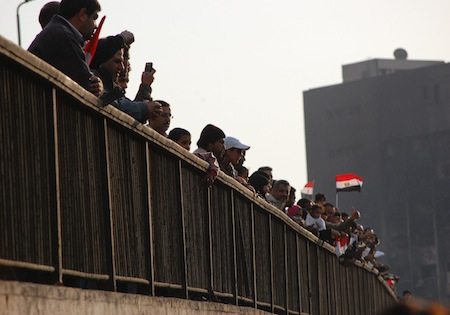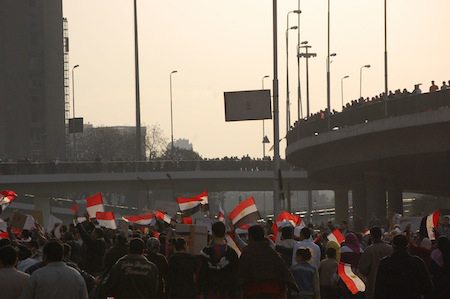The dark side of the Arab Spring
Student activism and more of the same
Watching the uprising in Egypt unfold these few months from abroad was both thrilling and absolutely terrifying. In the middle of a cold and dreary Montreal winter I remember watching the footage from the protests on my computer, clutching my miniature shisha pipe that I had so lovingly carried with me from my time in Cairo the past summer and anxiously calling my friends who were in the midst of it all in Tahrir, and the suburbs of Shorouq and Rehab.
The transitional period has been even more intriguing. Among the most interesting things to observe is the changes in the young Arab diaspora after the successful dethroning of Ben Ali and Mubarak, the continued fight against Gaddafi in Libya, and the dissent in Syria, Bahrain and Yemen.
Montreal is home to a large community of Arab immigrants and students from across the region. These past few years, I have often been baffled by how the Arab student population at my university could be so politically disinterested when there were protests or other events. In more casual settings, my friends seemed to be outspoken on several issues, especially those concerning Palestine and Israel. A few years ago, a group of activists wanted the bombing of the UN school during the 2008 Gaza bombings to be named a war crime. A year later, students brought about a university boycott of companies that actively take part in the occupation of Palestine.
At both of these events there was a large and well-organised group of pro-Israeli students, and a very small number of Arab students, often most visibly represented by the Muslim Students Association. I reasoned that this was due to a lack of open political culture and dialogue in the Middle East, the pressure felt by Arab students to act in a way that would dispel how they are portrayed in Western Media, and the fact that many of the students had precarious statuses in Canada. The goons of CSIS, Canada’s secret service, were already harassing friends of mine with family members in the Lebanese Army or other armed forces. They were unaware of their rights and spoke politely with these men every time they came in their ominous black SUVs. They felt guilty simply for being flagged.
But the explosion of political activism in the Middle East has been mirrored by a growing political interest in this diaspora community. I am part of a recently established group of Arab students at my university who are organising a conference this autumn. I feel internally conflicted by the project. These enthusiastic and well-intentioned students are attempting to launch the conference with a beautiful press packet and a strong team of volunteers. The focus of the conference, however, is very much driven in the direction of “economic development.” Inspired by the Harvard Arab Business Week, the idea seems to be making the whole region a remake of Dubai’s palm tree and astrolabe islands.
This conception of ‘development’ is about urban gentrification. An Arab utopian “Vision Book,” replete with illustrations of tall buildings and organised streets, will be presented to dignitaries and other important people at the end of the conference. Issues affecting the Middle East at the moment, like entrenched inequality and social stratification, the political and strategic significance of Israel and Saudi Arabia, water politics, the use of migrant labor in the Gulf, economic growth and its ties to corruption, increasing religious conservatism and gender inequality will necessarily be neglected.
Perhaps the larger answer for the lack of political participation by this group of students in years past is that many of the students that could afford to attend my university from abroad came from privileged backgrounds. These students are all like expatriate kids. They have expensive handbags and were educated in English and French. They grew up in Dubai, Saudi Arabia, or Europe. Their parents were those who had benefited from the reigning order, and for these reasons they approached the issues affecting the Middle East with cold disdain and disinterest.
I realised this during the protests against Bashar al Assad. Many of my Syrian friends had attended a French Lycée. Almost all of them were loyally pro-Bashar, and many of them were of the belief that: “The people are not ready to vote. They are not educated or responsible enough to vote.” One of these people is the granddaughter of the defence minister who worked under Hafez al-Assad for decades, even during the time of the massacre at Hama. Egyptian friends echoed these concerns as well. While all of them are vigorously patriotic, they approach their home region through the patrimonial and prejudiced lens of their British and American schools. To them, the Arab World is a backwards place, full of religious bigotry and oppressive tradition. Yet these are the students who have now jumped on the revolution bandwagon here in Canada.
I worry that despite the students’ righteous attitudes and aspirations there has been little self-reflection, and the form their alternatives and initiatives in the region is taking deserves serious reflection. They are the elites of their societies, and nothing has been organised for the conference to displace this power advantage or even accommodate those who are not representative of it. This kind of thinking was most evident when the issue of massive Saudi funding for the conference came up. What was a greater concern: meeting an already engorged budget estimate, or giving up the freedom of the group in its entirety?
This kind of ‘development’ is solely concerned with economic growth, whatever it happens to be. With their enthusiasm and use of strategic marketing lingo, this group of students will undoubtedly have very little trouble applying for funding, receiving publicity, and running the conference successfully. However, instead of deciding to take on issues that could really make a difference in the region, and are remnants of the economic stratification established and entrenched by colonialism’s occupying powers, they have chosen to keep the system as it is. These students are powerful and capable in terms of changing their societies, but intrinsic to this goal is seeing themselves as culpable and complicit members of them. In their slogans, they will use the words change, and solutions, and action, and I wonder whether little of this will actually happen.
Photos: Isabelle Mayault








